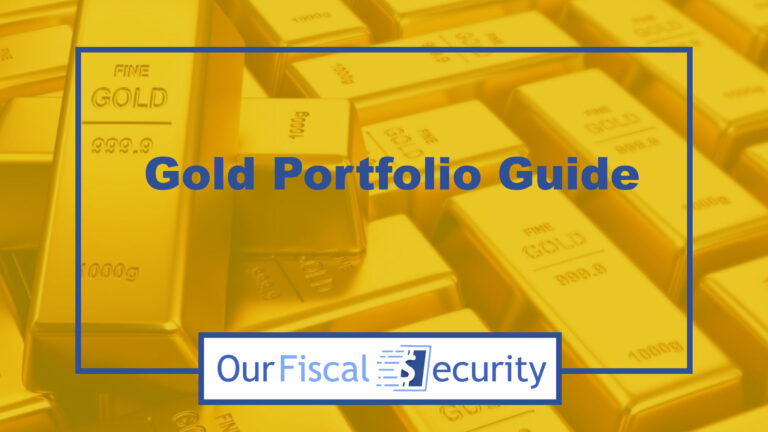Gold IRA Explained: Diversify Your Retirement with Precious Metals
Having an individual retirement account can help you grow your wealth in anticipation of retirement. Most of them feature stocks, bonds, and mutual funds, though there is another type of retirement account that holds gold bullion, coins, and bars.
You’ll need an appropriate precious metals dealer, and it’s wise to speak with a financial advisor to determine if a gold IRA is right for you. If you’re interested in holding physical precious metals, this article will explain the gold IRA concept, how to set things up, the types available, and much more.
Understanding a Gold IRA
Individual retirement accounts help people save for retirement, and they’re often tax-advantaged. There are various forms, such as Roth IRAs, traditional IRAs, and gold IRAs. Overall, a gold IRA helps investors stash money in physical gold and other precious metals, and they’re held separately from other IRAs.
Ultimately, gold IRAs are sometimes called precious metals IRAs. They can be set up as a Roth IRA with after-tax dollars or a traditional IRA with pre-tax funds. Unlike other types, gold IRAs require you to buy and store physical gold. Therefore, you’ll need to use a custodian to help you open a gold IRA account. Usually, a brokerage firm or bank will manage everything for you.
Traditional IRAs let investors hold mutual funds, stocks, and bonds. The IRS (Internal Revenue Service) lets self-directed IRA account holders buy gold bullion, coins, and bars. Likewise, they can hold palladium bars, platinum coins, and silver coins. Any precious metals can be stored in a gold IRA.
Defining a Gold IRA
There are IRA-eligible gold types of individual retirement account that let investors hold physical gold and other precious metals as a retirement investment.
Functionality and Purpose of a Gold IRA
The purpose of owning gold IRAs (individual retirement accounts) is to grow your wealth and have your money invested in various forms, including mutual funds, stocks, bonds, physical gold, and other precious metals.
Ultimately, a gold IRA is held separately from your traditional retirement account. However, it has the same rules for distributions and contribution limits. You’ll need to work with a specialized custodian and a gold IRA company.
Categories of Gold IRAs
There are many types of gold IRAs, similar to other retirement accounts. They include:
- Traditional Gold IRAs – This individual retirement account is funded using pre-tax dollars. Therefore, the earnings and contributions grow using a tax-deferred basis. Then, withdrawals are taxed during retirement.
- SEP Gold IRAs – As with traditional SEP IRAs, SEP Gold IRAs are only available to self-employed people and small business employees. You’re taxed on the withdrawals in retirement instead of on the contributions made. The IRS sets the limit for contributions. People can set aside 25 percent of their total income or $66,000 in 2023 (this grows to $69,000 in 2024). The lesser amount is what you use.
- Roth Gold IRAs – A Roth gold IRA is funded with contributions of after-tax money. Therefore, you don’t see the tax advantages immediately. Ultimately, you pay taxes upfront and don’t have penalties or income taxes due in retirement.
Gold IRA: A Physical Asset
Many investors find that buying gold for an individual retirement account is essential to their portfolios. They own a tangible and physical asset. Alternatively, mutual funds, stocks, and bonds are abstract concepts.
If you wish to own physical precious metals, a gold IRA could be the best solution for you.
Establishing a Gold IRA
It’s important to understand that you can’t use a conventional broker to set up a gold IRA. Traditional custodians don’t offer specialty individual retirement account products. If you wish to set up a gold IRA to hold physical gold and other precious metals, you’ll need a gold IRA company to handle the reporting and documentation required for tax purposes.
Financial Prerequisites for a Gold IRA
While the assets in a gold individual retirement account are different from traditional IRAs, the same rules apply. Therefore, you have contribution limits in place and must follow the distribution regulations for withdrawals.
The IRS has set 2023 contribution limits at $6,500, which increases in 2024 to $7,000. Likewise, you can add $1,000 more if you’re over 50 years old, totaling $7,500 and $8,000 (2023 and 2024, respectively).
You may start taking the distributions when you turn 59.5 years old without facing penalties. However, if you withdraw funds before that time, you’re subjected to a 10 percent tax.
Identifying a Suitable Gold IRA Custodian
A gold IRA custodian is the one who holds and manages the precious metals in your individual retirement account. There are many options available, but some providers will require you to use their partnered custodian. Even when gold IRA companies let you choose a custodian, they often encourage you to consider the preferred partner.
It’s wise to choose a gold IRA company that allows you to select your own custodian. Be aware that each one charges different fees.
Process of Acquiring Gold in an IRA
Investors fund gold IRAs by contributing money to them based on the annual contribution limits, which go to the custodian to handle.
The process to purchase gold within IRA involves investors’ selection of an appropriate broker or precious metals dealer to find the gold bullion, coins, and bars they prefer. Likewise, it’s possible to select platinum coins and silver coins for precious metals individual retirement accounts.
The gold is then sent to the depository.

Regulatory Compliance for a Gold IRA
Gold IRAs require specialty storage facilities. You must keep the physical gold in an IRS-approved depository or use an approved third party, such as a bank. Therefore, you can’t store the assets at home. If you remove the precious metals from the gold IRA, it’s considered a withdrawal. You’d have to pay taxes on it.
Assessing Gold IRAs
It’s important to understand the intricacies of gold IRAs. Let’s focus on the benefits and drawbacks now:
Benefits of Investing in Gold IRAs
Here are the benefits of gold IRA investing:
- Tax Advantages – Gold IRAs offer tax benefits similar to conventional IRAs. You don’t owe capital gains on the gold investments while they’re in the account. Likewise, you can sell the physical gold and other precious metals for a profit, though the proceeds must stay in the account to avoid penalties and tax. Ultimately, you could roll over your traditional or Roth IRA into a gold IRA. With Roth IRAs, you use after-tax dollars to contribute and see tax-free withdrawals in your retirement. Alternatively, you use pre-tax dollars for a traditional gold IRA, which provides an upfront tax deduction.
- Ownership of the Physical Asset – Some investors find it appealing to buy gold because they know they have a tangible asset. Typically, mutual funds, stocks, and bonds are abstract concepts.
- Purchases and Storage Included – Most gold IRA companies have marketplaces where you can buy and sell gold. They then partner with custodians to handle the storage and insurance.
Potential Drawbacks of Gold IRAs
Though gold IRAs have many perks, there are some potential downsides. These include:
- Less Pricing Transparency – Gold IRA companies tend to make their money by charging more for the physical gold coins and bars. Look at the spot price on COMEX; you’ll find that you pay more through a gold IRA provider.
- High Fees – Ultimately, gold IRAs aren’t cheap. You will pay for everything, such as annual fees to maintain the account, application fees, wiring fees, transaction fees to buy/sell gold, custodian account fees, and more. Likewise, it will cost to get money out of the gold IRA. This drains your return on investment.
- Complicated Restrictions and Rules – Gold IRAs are subjected to the same IRS rules as other individual retirement accounts. Therefore, you can only have specific types of gold in the IRA. Likewise, you can’t store your precious metals at home; they must stay with a custodian in an IRS-approved facility. Ultimately, you pay more and can’t see or touch your gold investments.
Unique Risks Linked with Gold IRAs
Every investment comes with rewards and risks; gold is simply one of them. In various ways, gold IRAs feature the same risks as other investments. For example, the price of gold can easily go up and down, and there’s volatility. No one can predict the future of gold prices accurately.
Despite the risks involved, there is a good reason to invest in gold and have retirement funds with it. Gold has a strong store of value; 5,000 years of history tell you that. Stocks can drop to zero in an instant and wreak havoc on companies everywhere. Likewise, bonds can default or see huge cuts. Plus, the US dollar’s value has steadily dropped down in the past. However, gold will never be worth nothing.
If gold prices do drop, this will probably mean paper assets are doing well. Therefore, if you have a balanced investment portfolio that features paper-based and gold investments, a loss on one side will balance out by the gain seen in other assets. Overall, most of the risks you see exist in traditional IRAs, but they have higher risks that gold IRAs don’t!
Still, there are some specific risks to investing in gold. For example, a physical commodity could be stolen. Though it’s improbable that a thief would break into a depository where the gold is stored, it is possible. Just remember that depositories holding gold IRAs must be insured. This will protect your investment if your account doesn’t exceed the stated value on the custodian’s accounts.
However, you also have to consider there are untrustworthy custodians who could steal from your account. They might also commit fraud if they sell precious metals to you that they don’t plan to buy or don’t have in stock. You can mitigate these risks by selecting a custodian who insures each financial transaction.
Comparing a Gold IRA and Physical Gold Ownership
If you plan to own gold, you might be wondering if it’s best to hold physical gold coins or get a gold IRA. It all depends on your preferences and circumstances.
Ultimately, physical gold costs less to buy, sell, and own because there are fewer fees. You can see it whenever you want, but you run the risk of someone stealing it. Though a safety deposit box or a safe can protect you, theft is still a possibility.
Gold IRAs offer tax advantages that you can’t find when owning physical gold. If you choose traditional gold IRAs, you use pre-tax dollars. This means you won’t pay taxes on the gold’s growth value until you retire and take distributions. Likewise, a custodian keeps track of it all, so you don’t have to do that yourself.
Alternatively, Roth gold IRAs use after-tax dollars. Therefore, you don’t see the tax benefits immediately because you pay taxes before the funds go into the account. Still, you enjoy tax-free retirement distributions when and if you take them.
Unfortunately, gold IRAs have higher fees than other accounts. Therefore, you might lose some of the money you put in when it’s time to retire. The added costs could eat up your gains.
Gold IRA Contribution Boundaries
Now, it’s time to focus on the contributions available for gold IRAs. This is how you fund the account each year, and you want to put in as much as possible to ensure more capital gains when you retire.
Varieties: Traditional, Roth, and SEP Gold IRAs
There are three main types of gold IRAs, and they work similarly to their conventional counterparts. They include:
- Traditional – A traditional IRA and traditional gold IRA use pre-tax dollars to fund the account. Therefore, withdrawals are taxed during retirement, and the contributions and earnings will grow using a tax-deferred basis. Many people like the idea of a traditional IRA (gold or otherwise) because they can write the contributions off on income taxes each year.
- SEP Gold IRA – These gold IRAs are available to self-employed people and employees of small businesses. Again, you’re not taxed on the contributions you put in, which is similar to a traditional IRA.
- Roth Gold IRAs – Roth gold IRAs work similarly to a conventional Roth IRA. It’s funded with after-tax money. This means you don’t get the tax advantage upfront, but you don’t pay taxes on the distributions you take in retirement. Ultimately, a Roth IRA (gold or otherwise) works well for people who believe they’ll be in a higher tax bracket in their later years.
Consequences of Surpassing Contribution Limits
Knowing how much you can put into the account is crucial. In fact, the IRS penalizes you if you go over the contribution limit. Right now, the penalty is six percent of the overage for each year that money stays in the account.
Understanding Gold IRA Contribution Limits
Traditional gold IRAs use the same contribution limits as conventional traditional IRAs. Therefore, you can put in $6,500 (2023) or $7,000 (2024). If you’re over 50 years old, the numbers rise to $7,500 or $8,000.
The contribution limits are the same for Roth gold IRAs.
Gold IRA Distributions
Learning how to put money into your gold IRA is important, but you also need to know about distributions. These are, in a sense, the payments made to you in retirement.
Navigating Required Minimum Distribution (RMD)
Ultimately, a traditional gold IRA uses required minimum distributions, which typically start at 73. However, the year you were born/age play a part. Typically, RMDs begin on April 1 of the year after you turn:
- 70.5 if you were that age before December 31, 2019
- 72 if you were that age from January 1, 2020, to December 31, 2022
- 73 if you were that age after January 1, 2023
Ultimately, metals aren’t particularly liquid. Finding the cash to make the distributions can be a problem. Therefore, you might have to sell some gold when it’s not at a high price. However, you can take the RMDs from any other traditional IRAs you have, leaving your gold IRA alone.
Withdrawing Procedures for a Traditional Gold IRA
Withdrawing from your gold IRA has the same rules as other individual retirement accounts. Here are the things to consider:
- Your contributions were made with pre-tax dollars.
- The distributions get taxed as ordinary income.
- Any distributions you take before 59.5 years old incur a 10 percent penalty.
- You’re required to take RMDs after you turn 73 (in most cases).

Withdrawing Rules for a Gold Roth IRA
Gold Roth IRAs don’t have the same withdrawal rules. Here are the things to note:
- Your contributions were made with after-tax dollars.
- You don’t pay taxes to withdraw funds.
- You’re not required to take minimum distributions and can leave the account to your heirs. They will have to follow the same RMD rules above.
- You don’t face penalties on the contributions you’ve made if you’re under 59.5 years old. However, distributions before 59.5 that dip into your earnings do face a 10 percent penalty.
Tax Implications of Gold IRA Distributions
With a traditional gold IRA, you put the funds in before the money is taxed. Therefore, when you get distributions, they’re considered ordinary income. Alternatively, Roth gold IRAs use after-tax dollars, so your withdrawals and distributions aren’t taxed in retirement.
Gold IRA Rollover Procedures
Many people have various retirement accounts, and it’s possible to roll over those funds into a gold IRA. Let’s learn more about this process:
Defining a Gold IRA Rollover
A gold IRA rollover means you transfer funds from a 401(k) or a traditional IRA to the self-directed IRA, allowing precious metals investments. Instead of your retirement savings being tied up in mutual funds, bonds, and stocks, you can diversify your portfolio to include gold, palladium, platinum, and silver.
Steps for a 401k to Gold IRA Rollover
Here are the steps to facilitate a rollover from a 401(k) to a gold IRA account:
- Choose a reputable gold IRA company/custodian to hold the assets and manage the account. They should have fair fees, a solid track record, and positive reviews.
- Contact your 401(k) account holder and let them know you wish to transfer funds from the existing account into a self-directed gold IRA. In most cases, your custodians will work together to do this for you.
- Set up your gold IRA account and wait for the funds to transfer.
- Start buying gold and other approved precious metals through the account.
- The IRA custodian handles all the paperwork and ensures that you’re following IRS regulations. Likewise, they will send the physical gold to an appropriate depository.
Understanding Direct and Indirect Rollovers
It’s possible to complete a direct rollover. With this option, the institution that holds your current 401(k) or IRA will transfer funds into the new gold IRA directly.
An indirect rollover is where you withdraw the money from your current 401(k) or IRA and deposit the funds into the gold IRA yourself.
Ultimately, direct rollovers are tax- and penalty-free and much faster. With an indirect rollover, you must receive the old account funds and get them into the new account within 60 days. If you don’t do this, the IRS calls it a withdrawal or distribution. Therefore, you’re taxed on it and will incur a 10 percent early withdrawal penalty.
Tax Regulations for a Gold IRA
Making a gold IRA work for you means understanding how taxes are handled. The IRS has strict rules in place, and you must ensure that you’re following them to avoid penalties and other issues. Let’s learn more about the tax rules for a gold IRA now:
Tax Advantages of a Gold IRA
If you choose a traditional gold IRA, you will see tax benefits immediately. The money you contribute to the account features before-tax dollars. This means you can use it as a deduction on your income taxes for that year. Likewise, the money grows tax deferred.
Roth gold IRAs are different. You use after-tax dollars to fund the account, so the taxes are already taken out in that year on your income taxes. This means you will pay more money upfront.
Tax Consequences of Gold IRA Distributions
Traditional gold IRAs do have tax-deferred benefits, but you will be taxed whenever you withdraw the money. Likewise, there could be capital gains tax if your account saw growth over the years.
Alternatively, the distributions from a Roth gold IRA are tax-free because you paid taxes on the funds before they went into the account. You’re also not required to take distributions, though traditional gold IRAs have minimum required distributions.
IRS Rules and Regulations for a Gold IRA
Along with the basic rules that other IRAs have, gold IRAs have more regulations from the IRS. For example, you cannot store the gold/precious metals in your home or in a vault you could access. It has to be stored with a custodian and in an IRS-approved depository.
Likewise, there are limitations on the types of gold you can hold in your IRA. The IRS requires these fineness levels:
- Gold – 99.5 percent
- Silver – 99.9 percent
- Palladium – 99.95 percent
- Platinum – 99.95 percent

Here are a few of the eligible items you can put in a gold IRA:
- Bullion and Bars – This includes gold, silver, platinum, and palladium bullion and bars produced to the IRS requirements and standards.
- Silver Coins – This includes Canadian Silver Maple Leaf, American Silver Eagle, Mexican Libertad, Australian Silver Kookaburra, and Austrian Silver Philharmonic.
- Gold Coins – This includes Australian Kangaroo and Nugget, Australian Lunar Series, Austrian Philharmonic, Canadian Maple Leaf, and US Gold Buffalo coins. Some Chinese Panda coins are eligible, too.
- Palladium – You can have bars or coins that meet the IRS standards.
- Platinum Coins – This includes Austrian Platinum Philharmonic, Australian Platinum Kangaroo, Canadian Platinum Maple Leaf, and American Platinum Eagle coins.
Non-eligible items can include:
- Collectible coins
- Coins that aren’t manufactured by a government mint
- Gold Krugerrands
- Pre-1933 gold
Gold IRA Associated Expenses
It’s wise to understand the associated costs and expenses of owning a gold IRA. Ultimately, you will pay more because of the many fees involved, and you should determine if that correlates to a smaller return on your investment later.
Initial Investment Requirements
You’ll likely work with a gold IRA company to facilitate the process of opening an account and choosing your gold. Each brand has its own initial purchase requirement. Some of them are lower at $7,500, while others have minimums of $25,000 or more.
Gold IRA Account Minimums
Typically, the account minimum for your gold IRA is similar to the initial purchase requirement. Therefore, if you must fund your account with $7,500, you will need to keep that same minimum balance for the account to stay open.
Additional Costs in a Gold IRA
It’s fair to say that gold IRA associated costs come with special expenses. You can expect to pay for these things:
- Seller’s Fee – While gold spot prices are set by the government, precious metals dealers can sell their gold supplies for whatever they want. Therefore, you should expect to see markups whether you choose coins, bullion, or proofs. The markup will generally vary based on the vendor, though it’s a one-time fee.
- Cash-out Costs – If you decide to close your gold IRA and sell the gold to another dealer, that person will pay less than the market price. Therefore, you could lose money. Unless prices rise significantly after you buy the gold, you could lose some of your capital. Many companies offer a buyback program. It will buy the gold back at the current wholesale rate. However, that might not mean capital gains for you.
Comparing Gold IRA Fees and Charges
Most conventional IRAs don’t come with the charges and fees listed below. Gold IRAs tend to have more fees because of the additional services included, such as insurance and storage of the precious metals. These costs will cover everything for you and consist of:
- Account Setup Fees – Some companies charge a fee for you to open a new gold IRA account. The amount will vary, depending on the custodian and brand, but it’s usually $50 or so.
- Transaction and Seller Fees – You might have to pay fees if you sell or buy precious metals from the IRA. You will do this each time you do so. The price could be $40 or more, which can be quite costly as time goes on.
- Custodian Fees (Annual Maintenance) – This fee covers the administrative and bookkeeping services. Typically, the custodian will bill you annually, and it could be $75 or more.
- Wire Transfer Fees – IRA custodians usually charge you each time you send funds and use a wire transfer (which is often the only option). It could run $25 or more.
- Storage Fees – You will pay to have the precious metals in the IRA stored at an IRS-approved depository. It’s often an annual fee, and it depends on many factors. Typically, you’re charged 0.5 to one percent of the total value of your metals.
- Insurance Fees – When the custodian sends the precious metals to the depository, they will often insure it to protect against theft. Sometimes, they do this for you and charge you higher custodian fees to compensate. Otherwise, you will pay for the insurance directly.
Alternatives to Gold IRAs
If you like the idea of investing in gold and aren’t ready to start a gold IRA, there are other options. They might be less expensive, as well. Let’s look at them now!
Investing in Gold Mutual Funds and ETFs
There are various exchange-traded funds (ETFs) and mutual funds that invest in gold. Some will just track the spot prices of gold and then trade the options and futures. However, others invest in gold stocks.
It’s easy to buy these funds through a standard IRA from a regular brokerage firm. However, you will not own any physical gold bullion. Still, it could be a less expensive and simpler route for investing in gold.
Gold Stocks as an Investment Option
Another option is to purchase the stock of a publicly traded gold processing, mining, and trading company. Usually, gold stocks do well whenever the price of gold soars. Therefore, you must research things more thoroughly. Also, check how the company performs overall because that might impact its stock price.
With this in mind, you could earn more money if you choose quality stock picks. You’d use a regular brokerage firm to purchase the gold stock and won’t have to deal with as many fees.
Other Forms of Gold Investments (and Other Precious Metals)
If you truly wish to invest in physical gold, you might want to make such investments outside of an IRA. This will help you avoid the restrictions, complications, and fees a precious metals IRA comes with. Consider buying gold and storing it at home.
Diversifying with a Precious Metals IRA
Ultimately, it’s wise to diversify your portfolio, and precious metals IRAs are just one way to do that.
Inflation continues to rock the economy, and people are uncertain of when it will start lowering again. Therefore, gold can hedge against inflation and become a valuable component in your retirement account.
Likewise, the price of gold will never be at zero. Though a company’s stock prices can plummet to nothing, gold has a store of value. Likewise, the central bank can decide to increase the currency supply, which reduces its value. However, it’s much harder to create new gold to increase its supply.
It’s wise to choose various asset classes, and gold has no correlation with bonds and stocks. Therefore, you could reduce your risk overall by having multiple investments.
Leading Gold IRA Providers
Gold IRA investors should understand that they require a gold IRA provider and a custodian to set up and fund the account with silver, platinum, and palladium metals. If you’re considering this investment opportunity, it’s wise to check out the top companies offering such services. Let’s dive in!
Criteria for Evaluating Gold IRA Companies
When finding a gold IRA provider, it’s important to choose the right one.
Ultimately, you must establish your self-directed IRA first. You will manage it directly but require a broker to purchase the gold. Likewise, a custodian creates the account and manages it for you. Then, you need a depository to store and hold the actual gold.
Custodians are typically credit unions, trust companies, banks, savings and loans companies, and brokerage firms. Regardless of the one you choose, it must be approved by state and federal agencies to offer asset custody services to financial advisors and individual investors. Established custodians usually have relationships with many dealers and will share that data with you.
However, most gold IRA companies recommend specific custodians they partner with exclusively. This is often the easiest option, though it might not be the least expensive.
Choosing the right company can be complicated because there are so many variables. Here are a few things to consider:
- Track Record – Choose a company with a great reputation from various objective third parties, such as the Business Consumer Alliance and Better Business Bureau. Read what other customers have to say about the brand and pay close attention to the number of complaints shown. Overall, you want a brand that is educational and doesn’t push.
- Transparency – It’s helpful to know the costs upfront so that you don’t experience a nasty surprise later.
- Qualifications – Only deal with companies that have the required and appropriate licenses, insurance, registrations, and bonds to protect yourself. You can ask to see the information before deciding to work with them and use their services.
- Flexibility – Every investor has different goals and needs. Therefore, it’s wise to select a company that caters to you instead of using a one-size-fits-all approach.
Highlighting Top Gold IRA Companies
It’s time to check out the top gold IRA companies. Here is our list of the best choices:
Birch Gold Group
Birch Gold Group offers gold IRAs and has upfront transparency about the cost associated with the account. On its website, it provides the recommended minimums and lays out all the fees to help you decide if it’s right for you.
Overall, Birch Gold Group has many precious metals products and offers educational resources for beginners. Plus, the Better Business Bureau gives it an A+ rating, and the Business Consumer Alliance offers a AAA rating.
You can do a transfer from your eligible 401(k), traditional IRA, or Roth IRA.
American Bullion, Inc.
American Bullion, Inc. is ideal for beginners because it offers many educational resources for precious metals. Likewise, you deal with a full team of experts who can get you the facts you need.
This precious metals dealer offers free storage for your first year. Plus, the precious metals are stored in the Delaware Depository Service Company, which is monitored 24/7.
Goldco
Goldco is a solid gold IRA option because it has excellent ratings from the Business Consumer Alliance and the Better Business Bureau. Likewise, it allows rollovers from various accounts, such as IRAs, savings, TSP, 403(b), and 401(k). Still, you will have a higher initial purchase requirement.
Ultimately, Goldco has a high buyback guarantee compared to other brands. Therefore, it will buy back the precious metals at a higher price when you’re ready. Plus, you can call customer support, and there’s a live chat option to answer your questions. If new customers meet the purchase minimums, they can get five to 10 percent back in free silver!
Rosland Capital
Rosland Capital is a great choice for those who don’t have a lot to invest. The minimum purchase for precious metals is $2,000. Plus, it has great ratings from the BBB and BCA, and there are many storage options for the gold you choose.
However, Rosland Capital doesn’t offer many resources to help you learn about investing and gold IRAs. Likewise, the website is pretty cluttered, which can make it hard to find information.
American Hartford Gold
American Hartford Gold primarily helps experienced investors. The website doesn’t have educational materials like some of the others. Plus, it uses a tiered fee schedule, so you will pay more in annual fees if you keep more money in the account.
Overall, American Hartford Gold has decent ratings from the BCA and BBB, and you can easily roll over your existing IRA into a precious metals IRA.
Features and Services of the Best Gold IRA Firms
The best gold IRA companies offer various services. Of course, the main goal is to have precious metals in your IRA, but they might also provide options for traditional or Roth IRAs.
You also need to consider the features it offers, such as:
- Easy Setup – Reliable providers work hard to find new clients, so they want the process to be stress-free and easy. Customers can often open gold IRAs in a few days and have assistance from professionals.
- Variety – One reason to open a gold IRA is to diversify your portfolio. Therefore, you need a company offering various precious metals, including silver, platinum, and palladium. Alternatively, you can choose a brand that has only gold and silver but a wide assortment of each.
- Buybacks – You decide which precious metals to purchase for your IRA. Most companies offer buybacks. This means you can sell the gold back to the brand without an additional expense.
- On-hand Financial Advisor – Most gold IRA companies have financial advisors on hand to help you through the process. However, it might also be wise to speak with an independent one to ensure the information is correct.
Frequently Asked Questions
Is Gold a Viable Retirement Investment?
If you want a diversified portfolio, it’s wise to invest in gold through an individual retirement account. Historically, gold has been a hedge against inflation and protects against market volatility. However, it’s volatile itself. Therefore, gold can lose value.
Likewise, other retirement options offer dividends and income, such as bonds and stocks. This doesn’t happen with a gold IRA. The higher costs, volatility, and lack of liquidity could make gold seem like the least optimal choice.
What Constitutes IRA-eligible Gold?
IRA-eligible gold has strict purity standards set up by the Internal Revenue Service. Typically, physical gold must be 99.5 percent pure and must be considered legal tender. Bullion rounds and bars have a fineness level of 99.9 percent to be eligible for your gold IRA.
Who Safeguards My Gold in a Gold IRA?
If you have a gold IRA, the physical gold and other precious metals must be handled by an IRS-approved custodian. They will deposit it into an IRS-approved depository for you. If you try to take possession of your gold, it’s considered a distribution and is taxed.

What Are the Costs Involved in a Gold IRA?
Gold IRAs have many different fees. Typically, you will pay to set up the account, manage it, and more. Plus, there are higher markups, custodian fees, and more.
Can I Purchase Physical Gold for My IRA?
Technically, you can buy physical gold and ship it to the depository yourself. However, the IRS has rules in place on what products are suitable. Therefore, it’s wise to buy the gold from a gold IRA company, which sends it to the depository for you.
Conclusion
A gold IRA is primarily a self-directed individual retirement account that allows you to hold physical gold, palladium, platinum, and silver as investments within. It is similar to a traditional IRA and has many of the same tax advantages available. However, you can hold precious metals instead of stocks and bonds.
Ultimately, it’s crucial to understand the specific regulations and rules related to gold IRAs. It’s wise to speak with a financial advisor before making a decision to invest.






